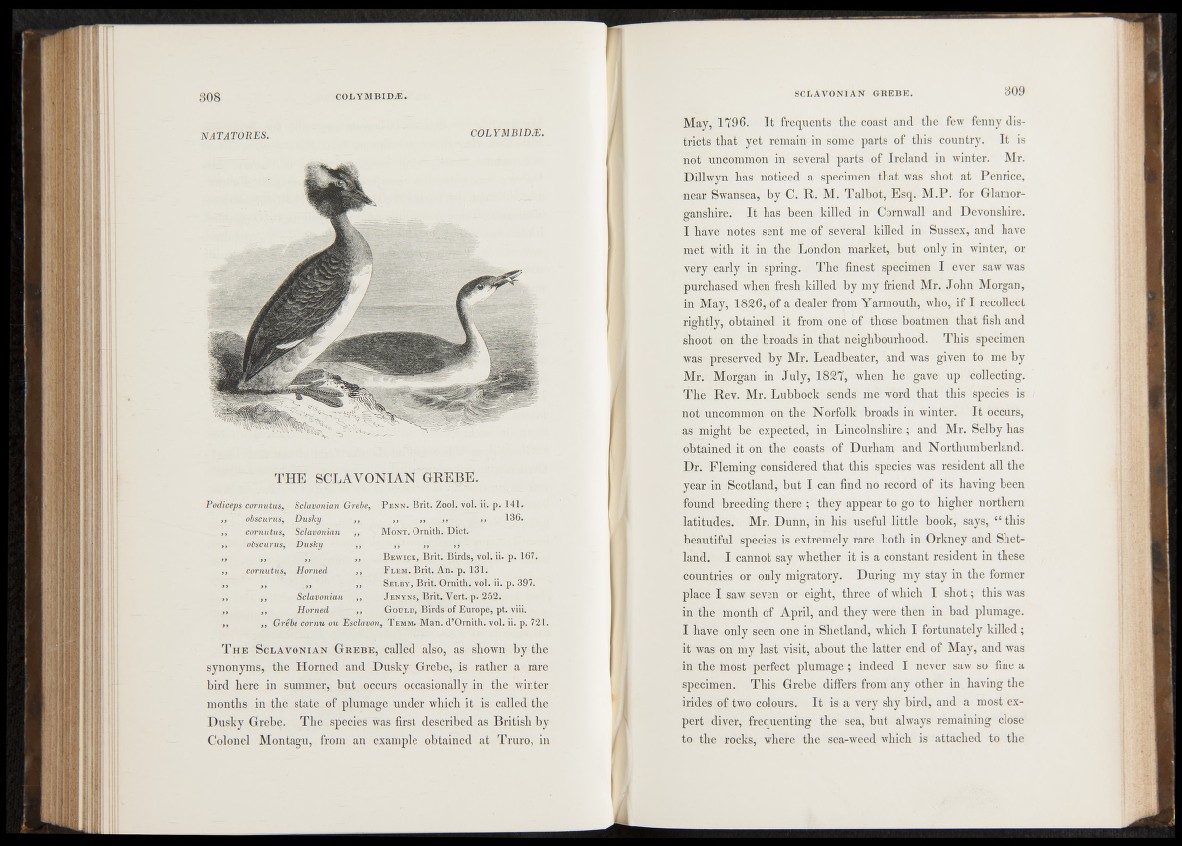
NATATORES. COLYMBIDÆ.
T H E SCLAVONIAN GREBE.
Podiceps cornutus^ Sclavonic n 'Gtebe,
obsçurus,
comutus,
obsçurus,
Dusky
Sclavonian
' Dusky
. cornutus, Horned
„ Sclavonian
,, Horned
|*ENw^Tit. Zool. vol. ïi. p. 141.
„ „ ;,T „ . 136.
Mont. Ornith. LiefrA
)> >! >>
-B ewick, Brit.fBirdsJ^ol.'li. p . 167,
. Flkm. Brit. An. p. 131.
SeLbV, Brit. Ofmith. vol. ii. p. 387.
J en y n s, Brit. Vert. pà'252;
Goüld, Birds of Europe, pt. v i i i . .
,, Grèbe cornu ou Esclavon, Temm. Man. d’Orriith.voi>ii. p, 721.
T h e S c l a v o n ia n G r e b e , .called also, as shown;by the
synonyms, the Homed and Dusky Grebe, is rather a rare
bird here in summer,: but occurs occasionally in the winter
months in the state._of plumage under which it|||j called the
Dusky Grebe. The species~was first described as British by
Colonel Montagu, from an example obtained at Truro, f i
May, 1796. I t frequents the coast and the few fenny districts
that yet remain in some parts of this country. I t is
not uncommon in literal parts of Ireland in winter. Mr.
Dillwyn has noticed a specimen that was shot at Penrice,
»near Swansea, by C. R. M. Talbot, Esq. M.P. for Glamorganshire.
It has been killed in Cornwall and Devonshire.
I have notes;.sent me o f ’several killed in Sussex, and have
met with it in the London market, but only in winter, or
very early in spring^ The finest specimen I ever saw was
purchased when fresh .-killed by my friend Mr. John Morgan,
in May, a .dealer from Yarmouth, who, if I recollect
rightly, obtained it from oni of those boatmen that fish and
shoot on the broads in that neighbourhood. This specimen
was'preserved by Mr. Leadbeater, and was given to me by
Mr; /Morgan in July, 18&7, when he gave up collecting.
The Rev. Mr. Lubbock sends me word that this species is
not; uncommon on the Norfolk broads in winter. It occurs,
as might be expected, in Lincolnshire; and Mr. Selby has
obtained it on the coasts of Durham and Northumberland.
Dr. Fleming considered that this species was resident all the
year-in Scotland, but I can find no record of its having been
found breeding there ; they appear to go to higher northern
latitudes. Mr. Dunn, in his useful little book, says, “ this
beautiful species is extremely rare both in Orkney and Shetland.
I cannot say whether it is a constant resident in these
countries or only migratory. During my stay in the former
place T saw seven or eight, three of which I shot; this was
in the month of April, and they were then in bad plumage.
I have only seen one in Shetland, which I fortunately killed;
it was on my last visit, about the latter end of May, and was
in the most perfect plumage; indeed I never saw so fine a
specimen. This Grebe differs from any other in having the
irides of two colours. I t is a very shy bird, and a most expert
diver, frequenting the sea, but always remaining close
to the rocks, where the sea-weed which is attached to the